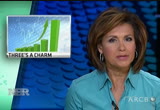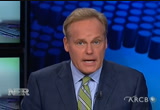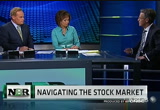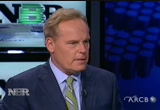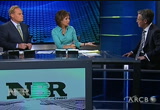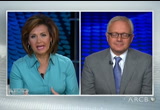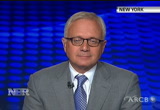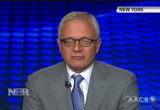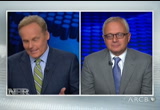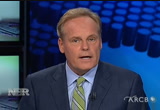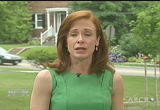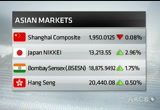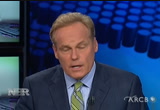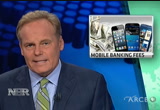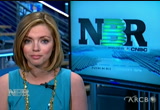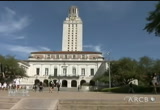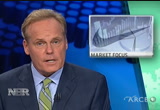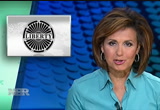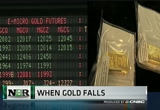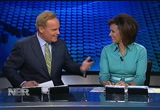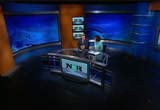tv Nightly Business Report PBS June 27, 2013 4:30pm-5:01pm PDT
4:30 pm
this is "nightly business report" with tyler mathisen and susie gharib. >> brought to you by thestreet.com. tools for an ever changing financial world. our dividend stock advisor guides and helps generate income during a period of low interest rates. real money helps you think through ideas of investing and trading stocks. action alerts plus is a charitable trust portfolio that provides trade by trade strategies, online, mobile, social media, wearethestreet.com. the dow sees the best three-day gain in almost a year.
4:31 pm
is the wobbling market behind us? we'll ask the chief investment officer of jc morgan. pain in the apps. why the banking in the mobile device, the wave of the future will cost you. and a trillion dollars in new student loans will be issued in the next decade and congress is days away from letting the interest rate double. all that and more tonight on "nightly business report" for thursday, june 27th. good evening everyone. if investors think the fed will hike short-term interest rates any time soon, they've got it wrong. bill doubly president of the new york federal reserve bank and a policy maker at the bank after ben bernanke. he said they are miss reading it a rise in short-term rates is very likely to be a long way off. >> the policy depends on the progress we make towards our
4:32 pm
objectives, and this means that policy including the pace of asset purchases depends on the economic outlook, not the calendar. >> they were reassured and some upbeat economic report s today. the government said consumers earned more and spent more in may and first time jobless claims fell by 9,000 over the past week. the dow jumped 114 points closing above the 15,000 level. the nasdaq added 20, the s and p rose by 10 points. susie, shifting sometimes day by day from big gain to big drop and back again. more confounding some days like yesterday the markets rise is traced to weak economic data that might stay the fed's tightening hand. other days like today the markets are good economic numbers, so go figure. tonight that's what we'll do. we invited two of wall street's
4:33 pm
best and help you go figure. we'll call it the go figure summit. jp morgan's private bank chief office and more smart calls on the economy than anybody. richard, let's start with you. you say the fed is not going to go cold turkey, which is certainly what mr. doubly seems to be saying, if i infer from that you think this is not a bad time to invest and be in the stock markets. it ain't over. >> we've been in stock markets and took advantage of the week four to actually add into equity. i think the big debate for me is continuing to make this an event and it's going to be a process and the process is protracted with slow growth, low inflation and a corporate sector that we've ever seen stronger. the one thing that does have to change is people's expectations on returns need to come down a little bit. >> do you think, richard, that we have over done it on fed
4:34 pm
talk? have they got off track from basics like earnings, revenues and corporate strategy? >> some of it is just emotion. at the end of the day we forget that markets are people, and we've had a market that for the most part has gone up in one direction for 12 months. when you go up that far and this year that fast, you tend to lose prospective how high you are and we were grappling with the provocation for more professional investors to take profits, and to me, that's a large part of what we've seen over the last three to four weeks. >> let's talk about bonds, which is an area you spent a fair amount of time thinking about. >> yes. >> and your caution to add just your return expectations. >> yes. >> a lot of people own a lot of bonds in private accounts. what should we think now? >> we've been ahead of this, so when i think how we position private banking clients globally, don't over think
4:35 pm
bonds. for us it's sticking to very short duration. you're not going to make a lot of money. manage your expectations. the income, be very careful about because if you're focussed too much on income, you can end up with bonds with long erma to -- maturities. lattering them and rolling them and waiting until you extend to higher interest rates, which we see out several years is really the way we've been playing it. what we've been doing against that is barbelling in things like equities and adding to equities and port follows since last year funded from credit markets. >> tell us more about going into equities, because we're at half point and seems like an inflection point as getting out of bonds, as they have got cash. do they go all into stocks right now? >>. [ laughter ] >> what happens over the last six months? >> it's funny. everybody started the year saying we hate bonds, what frustrated me the most is they
4:36 pm
don't tell you what to do on fixed income and leave the answer all stocks. most of our clients don't need the extreme. so we said two things to clients this year. first and foremost, not a year to be out of market. if you're waiting for the world to normalize, this is the normalization. it will be projected. two, to be balanced investing. over weight equity allocations but we've been much more balanced in that. we funded a lot from credit markets that had phenomenal returns over the last four years but not over reaching, either. markets aren't cheap. they are fairly valued. >> thank you very much. >> thanks. well let's turn to danny for his thoughts on this. ed, great to have you on the program. been awhile since we've seen you. we want your view on the economy and market. let's start with the economy. you see the data. >> yeah. >> you see what consumeers are doing with their money, all of this fed talk. tell us what kind of shape is this economy in?
4:37 pm
is it healed? >> it's healing. it's growing at a subpara pace. if you take out government spending, private sector economic activity has been growing 3% on a year to year basis since mid 2010. so i think a lot of what we're seeing is that the government's role in directly spending on economic goods and services has actually come down and the private sector isn't doing too badly however, the employment situation is slow and got the feds spooked and right now a major issue whether they will do it or not depending on the labor market. >> all and all the economy is growing but slow. >> ed, i heard you earlier today talking about something we mentioned in the introduction. one one day the market goes up because the economic data is bad and the next day the market goes
4:38 pm
up because an economic data is good. how do you make sense of that? >> you can't. if investing and trying to make money isn't serious, it's comical, really, what we've seen tuesday. we had really strong economic indicators and wednesday revised down and the market went up. i think you have to kind of tune out the noise, and we're getting a lot of noise not just from the economy but federal reserve. i think we do have to focus on the fundamentals and don't necessary make the headline. earnings per share continued to be strong. the growth rate is slowing down, but they are at a record high, and compared to the opportunities right now in the bond market, stocks still look to be a pretty descent place to invest. >> ed, you say there is noise coming from the fed. do you think these fed officials are talking too much and
4:39 pm
confusing investors? >> if i had my brothers, we would pass a gag order and stop them from the chitchat. i can't prove for sure but i was the early one to call it the federal open mouth committee. they talk too much. the notion that talking more is going to make things clearer for us just is -- is just not working out. but it is what it is. i mean, they will continue to do that, and i think, look, the bottom line really message that we're getting the past week or so is that qe will be faced out if the economy does better, if the economy doesn't do better qe won't be faced out. >> yeah. >> think about the troubles over the past four years. if this is our big problem, we're doing well. >> enough transparency already, a little more. isn't an environment with low inflation and moderate growth pretty good on balance for stocks? >> that's a very, very good
4:40 pm
point. i have been increasingly coming to that view that, you know, usually if you have a business cycle, it tends to last about four or five years, and what happens at the tail end, you get too much inflation and the federal reserve tightens and a recession. if we continue to have low inflation and slow growth, it will be another four years. >> ed, that's a good note to leave this on. thank you so much. great having you on the program. >> pleasure. one of the biggest drivers of the recovering economy and the rebound in housing and today good news there. pending home sales, deals signed but not closed rose to the highest level in more than six years in may and are up 12% from may last year. that rush to lock in a deal may have a lot to do with rising mortgage rates which jumped to a two-year high this week a. 30 year fixed rate loan is 4.46%,
4:41 pm
that's a half percent more than a week ago. that increase is the biggest in one week since 1987. shares of kb homes ended lower after reporting a net loss of nearly $3 million last quarter, mostly on a big wright down over water damage repairs, but the news wasn't all bad. revenue was 73% higher and kb delivered 39% more units while prices on those homes were 25% higher than in the same period a year ago. kb home and other big home builders are feeling some of the heat from those rising mortgage rates that tyler just told you about. they took the biggest leap in 26 years and inching closer to 5%. that rise is expected to impact future home sales, as well as sales that have already been made. diana olick has that story. >> reporter: sales of new by built homes rose to the highest level in five years, according to a commerce department reporterlier this week. but the numbers may be
4:42 pm
misleading. think are based on signed contracts, not closings in may. many of the homes sold haven't been built yet so buyers wouldn't have locked in loans and mortgage rates are up since then. >> a low lock under construction is they don't know their closing dates. >> reporter: steven paul is getting calls from concerned customers asking about longer term rate locks but they can be expensive. >> the cost of doing a loan lock up to nine months, runs 2.5 points and a lock for three months is .5, so people are trying to judge on whether they want to invest in the loan lock. >> reporter: california analysts mark hanson says roughly 70% of may sales for the builders are suspect. he points to the numbers, of the sales contracts signed in may 31% were for completed homes so buyers would have locked in mortgage rates near record lows,
4:43 pm
no problem. 24% were for homes under construction so some locked in a rate if the home was almost done, but some did not and 36% of the sales contracts signed in may were for homes that were not yet started. those buyers in most cases did not lock in rates and are already facing sticker shock at today's level. that could mean cancellations. >> it will be depending on the type of home builder that you're looking at. if you're looking at the coal brothers, a luxury builder, those customers can afford a rate rise and still be able to close their home or buy a home. so it's going to be very dependent on the significaegmen housing market. >> reporter: analysts for the big public builders say they are watching it closely and some do expect cancellations to climb. the jump in rate since the beginning of may pushed the average barrowers payment up 15%. that's make. >> reporter: break for some buyers. for "nightly business report,"
4:44 pm
i'm diana olick. >> for more, read her piece on our website, nbr.com. overhauling the nation's policies on immigration, one that offers citizen ship to those here illegally and suring up the borders in mexico. 32 opposed and 68 in favor but heads to the are you pub can controlled house where it faces tough opposition. the trillion dollar issue, is congress any closer to preventing student loan rates from doubling on monday? first, here is how the international bond closed on monday. wall street regulators filed
4:45 pm
a self lawsuit against john corzine for his role in the failure of mf global, the trading firm he ran before it collapsed in 2011. the trading commission says corzine failed to super vice dill gently the activities of mf global's officers, employees and agents. the lawyer said he did nothing wrong and looks forward to vin kating him in court. the ceo held hostage by his own workers in china is now free. the nearly week-long stand off in his factory in beijing ended with chip walking out the door but settling with workers. more troubles for paula deen after she admitted using racially charged words in the past. qvc is taking a pause, pulling her off the air, removing the cook ware and home goods baring her name on the website.
4:46 pm
two other major retailers, target and home depot will face them out. one day after walmart did the same. but book buyers apparently are standing by ms. deen. sales are so strong she's on the best seller list on amazon. another former paula deen sponsor, smith field foons has a senate hearing. the july 10th hearing will get plenty of attention since the $4.5 billion deal would be the largest chinese buyout of an american company. when some of the same lawmakers implemented certain fees and personalities they often charge their customers, but some banks have found a new revenue stream capitalizing on the sharp rise in mobile banking on smart phones and tablets. >> reporter: in order to point, snap, deposit, you may have to
4:47 pm
pay. long offered free to customers mobile banking apps have various fees that are slowly but surely adding up. minneapolis based u.s. bank corp charged 50 cents to make a remote check deposit for three years. alabama based regions financial charging 50 cents, too, but a whooping $5 if you want the funds right away and wells fargo, the first universal bank to move into mobile fees for premium products like bank to bank transfers or emergency bill pay that posts immediately. banks say the sooner to post your funds, the more risk for them since they don't have time to verify the money is there. banks are currently loblying washington regulators to try and get cheaper insurance for the funds to start to waive some of the fees. richard hunt president of the consumer banker's association says the move is natural. they offered checking accounts for free, too, but can't afford
4:48 pm
to because of the legislative and regulatory pressure, not to mention the high tech investment. some customers could embrace small fees. >> if bank of america charges me $1 to deposit a $49 check, but if they charge $5, i'm sorry, i definitely will not use it. >> reporter: others would change the way they bank entirely. >> i would probably change banks, if, you know, bank of america wasn't doing that and chase was, i would move my money. >> reporter: each month, millions of checks are digitally deposited at big u.s. financial institutions and the number of non-traditional bankers surged 55% in the last year. no doubt banks have a captive audience, always on the go and on their phones. now time is money and saving time could cost you money, too. >> i do it solely for the convenience and actually, it's not very often. if they started to charge me for it, enough is enough.
4:49 pm
>> reporter: for "nightly business report" i'm kayla. for more log on nbr.com. >> start thing monday students looking to secure a new subsidized student loan will likely be paying a much higher rate. hampton pearson has more. >> reporter: more than 7 million colleague students will take out an estimated $30 billion this year in government subsidized stafford loans according to the department of education. unless congress acts, interest rates will double from 3.4 to 6.8% on july 1st, just four days away. brandon anderson, a senior at georgetown university looking at more than $25,000 in loan debt by the time he graduates is among the millions of college students nationwide anxiously watching and waiting to see what happens to those interest rates. >> rates doubling is not good. it's not good because it takes more money out of not just my
4:50 pm
pocket but the pockets of millions of other students and shuts out a lot of students, especially lower income students. >> reporter: on capitol hill a compromise to reform the entire student loan program was introduced. a ten-year blueprint for an anticipated $1 trillion of loans over the next decade. all new loans will be seth to u.s. treasury bond rates plus 1.85% for subsidized and unsubsidized under graduate loans. it will be a fixed rate with a cap on those rates for consolidated remaining at 8.25%. >> we're notorious for not fixing anything and kicking the can down the road. we said enough is enough. >> reporter: he is among democrats that want to stop the clock calling for a one-year freeze on loan rates. >> this legislation could extend the current rate of 3.4%, the rate we have today for
4:51 pm
need-based loans. these are subsidized loans. >> reporter: despite the differences, many say it's possible for lawmakers to make a deal after the july 4th recess, and have those terms applied retroactively. for "nightly business report," i'm hampton pearson on capitol hill. coming up on the program, as gold prices drop, are consumers dumbing their coins in bars or buying more? how commodities and treasuries faired today. earnings report, a large part of the market focus tonight. nike reported 22% gains on improved revenues and gross margins. nike says it has $12 billion in future orders for delivery through november, up 8%.
4:52 pm
nike shares up during the regular session closing at $63.32 and jumped during after hours trading. reporting profits ahead of estimates and raising the long-term outlook as savings from an acquisition begin to kick in. net sales there up 34%. investors bought the long-term view pushing shares up more than 5% on double the normal volume and closed at $35.04. after the market close, facer announced a $10 billion share buy back compared toization -- authorization. closing at $28.18, up a fraction but popped a bit on the buy back news. a good day for liberty media and cable stocks. they jumped on a report john malone is working on a plan for charter communications to buy timewarner table. liberty owns a piece of charter.
4:53 pm
timewarner and charter up more than 4%. liberty gained more than 2% and cable vision up more than 5%. and rvs are back on the road and that's why wirnnebago, reported the backlog more than doubled as baby boomers take to the road. their stock has also doubled over the past year but today it was flat closing at about $21 a share. and gold prices fell below 1200 announced today for the first time since august of 2010, and just as there were a lot of buyers for gold coins and bars, what consumers are doing now that gold prices are falling. >> reporter: when gold prices fall, gold trading rises. >> whether we see a spike to the downside, it gets busy real fast. >> reporter: it started getting busy real fast this week at california investments in los
4:54 pm
angeles where they buy and sell gold and silver, coins and bars. gold has falcon prices not seen in three years and while that led to panic selling, $1200 an ounce are a bargain. not everyone is a believer. a survey shows fewer than half, 44% believe gold prices will rise over the next 12 months, a year ago 71% believed they would. >> then there is silver. at the beginning of the year this 100-ounce bar was worth $3,000 and now worth $2,000. there is sometimes more buyers than material to sell, but that has not made it more expensive. so have prices peaked? is the gold rush officially over? when we were at california in mid april after gold fellow one man sold a few million worth, he's not returned to buy it back at a lower price. those buying gold is a hedge
4:55 pm
against inflation, haven't seen much inflation. >> i think that's the problem. i think you can't print the kind of money they are printing, add $3 trillion to the balance sheet of the fed without an effect. >> reporter: however, figuring out where prices go from here is as difficult as betting on what the fed does next. for nightly business report, jane wells, last oos angeles. we told you about bank fees for mobile banking so imagine how high they might be if you do it from space. pay bapal is launching a new sym to figure out how to pay for things in space. the idea is to get a big jump on money expected to be spent on space travel. maybe partner with richard branson. >> you don't have to take your wallet when you go there? >> no thanks for watching i'm susie gharib.
4:56 pm
>> i'm tyler mathisen, thanks for watching from me as well. we hope to see you back. good night. "nightly business report" is brought to you by -- >> thestreet.com interactive financial multi media tools. the dividend stock advisor guides and helps generate income during a period of low interest rates. real money helps you think through ideas for investing and trading stocks. action alerts plus is a charitable trust portfolio that provides trade by trade strategies. online, mobile, social media, wearethestreet.com.
5:00 pm
97 Views
IN COLLECTIONS
KRCB (PBS) Television Archive
Television Archive  Television Archive News Search Service
Television Archive News Search Service 
Uploaded by TV Archive on

 Live Music Archive
Live Music Archive Librivox Free Audio
Librivox Free Audio Metropolitan Museum
Metropolitan Museum Cleveland Museum of Art
Cleveland Museum of Art Internet Arcade
Internet Arcade Console Living Room
Console Living Room Books to Borrow
Books to Borrow Open Library
Open Library TV News
TV News Understanding 9/11
Understanding 9/11

